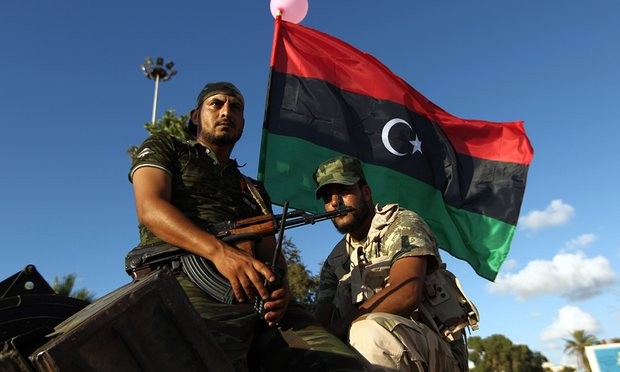UK government to be questioned over intention to send troops to Libya

Parliament’s foreign affairs select committee is to ask the government whether it intends to send as many as 1,000 non-combat troops to Libya in an attempt to train a Libyan army capable of driving out Islamic State from the country.
Senior members of the committee were told in Tunis last week that the formation of a Libyan government of national unity (GNA), which was announced on Saturday, would pave the way this week for a European conference on military intervention including the UK defence secretary, Michael Fallon.
Committee members were told that the Italians would provide 5,000 troops and the UK 1,000, with more troops probably provided by the French. The British government is becoming increasingly concerned that a military vacuum in Libya has allowed Isis to gain a foothold around the town of Sirte in Libya as well as to make military incursions inside Tunisia. But there is frustration on the committee at the evasive responses from the government over its plans for Libya.
It is also expected that members of the committee will ask David Cameron to give evidence to its wider inquiry into Libya after Barack Obama last week claimed that the prime minister had become distracted and failed to pay sufficient attention to the Libyan slide into chaos in the wake of the western-backed overthrow of Muammar Gaddafi in 2011.
Critics say Cameron has got off lightly on his single most significant foreign policy intervention as prime minister. The committee has taken evidence from the then foreign secretary, William Hague, the then defence secretary, Liam Fox, and the then international development secretary, Andrew Mitchell, but not from Downing Street.
One committee member said it would be a good idea to work out what went wrong with the last Libyan intervention “before we agree to a new one”.
Senior members of the committee believe Fallon Tobias Ellwood, the foreign office minster, and Cameron are determined to avoid seeking the permission of parliament to send troops to Libya, partly because the request will be denied and might highlight the Libyan mess.
Ellwood last week wrote to the select committee to say he would not be able to provide further details of the role being played either by the Royal Air Force or UK-controlled drones over Libya. Ellwood has admitted drones have flown over Libya and it has been repeatedly reported that UK special forces are in the country.
It is thought the west has rejected a plan to put formal combat troops on the ground, and instead will present the large troop presence purely as a training and advisory force for the Libyan national army.
One senior MP likened this option to a tethered goat, vulnerable to attack.
Another source said it was clear this was being orchestrated from London and as soon as the Libyan government was formed it would formally request a foreign intervention.
Both politically and legally, the status of the new government is questionable since no motion has been voted on by the House of Representatives based in Tobruk to form the new government, but instead a statement of support has been signed by a majority of the Libyan parliament.
It is not clear if constitutionally this vote represents a mandate that the United Nations could recognise, or will create a stable government if it does not have the support of General Khalifa Haftar, commander-in-chief of the Libyan National Army.
Egypt has been pressing the west to lift arms embargoes so that Haftar can lead the fight against Isis with greater success.
Britain’s Libya ambassador, Peter Millet, called on Sunday for a partial lifting of the UN arms embargo to enable forces loyal to the new government to battle Isis, telling a Maltese newspaper: “We would be happy to consider applying for an exemption to the arms embargo if the request comes from the unity government.”
However, the UN panel responsible for policing the embargo has voiced caution, issuing a report last week saying there was a danger the weapons would fall into the wrong hands.
“The risk of diversion and misuse of materiel will remain very high, regardless of the formation of the government of national accord,” said the UN security council’s panel of experts. “The panel therefore believes that the provisions of the arms embargo should not be eased prematurely.”
Inside Libya, there is some opposition to the new government, with 10 of the 40 members of Libya Dialogue, the UN-chaired negotiating team responsible for creating it, issuing a statement demanding Libya’s elected parliament in Tobruk first get a vote. They include Libya’s largest party, the centre-right National Forces Alliance.
“Having the GNA with international support and no credibility on the ground is the last straw to the end of Libya and its stability,” said the Libyan activist and lawyer Hana Gallal. “It will add to the confusion.”
The United States, the EU, Britain, France, Germany and Italy issued a joint statement on Sunday expressing “full support” for the GNA as “the only legitimate government in Libya”.
Outside powers have urged the GNA to move from its base in neighbouring Tunisia to the Libyan capital, but Tripoli has seen regular skirmishing between rival militias in recent weeks.
Securing the capital is likely to depend either on foreign troops, or the GNA securing agreement with a number of Tripoli militias to act as its security force.
How to submit an Op-Ed: Libyan Express accepts opinion articles on a wide range of topics. Submissions may be sent to oped@libyanexpress.com. Please include ‘Op-Ed’ in the subject line.
- CBL devalues dinar by 13.3% against foreign currencies - April 07, 2025
- Libyan teen wins bronze for natural antibiotic discovery - April 07, 2025
- Tunisia begins major migrant camp clearance - April 05, 2025


